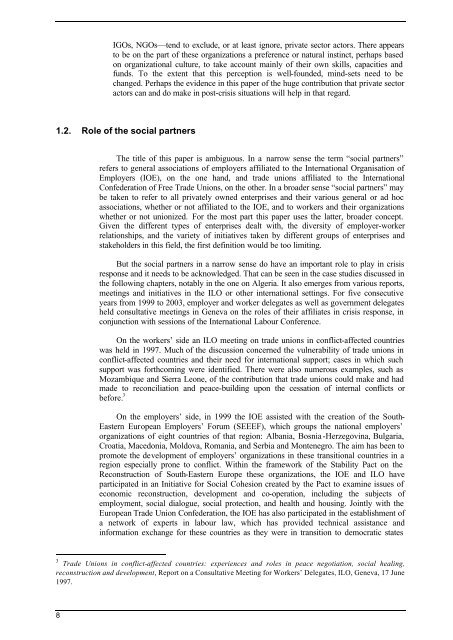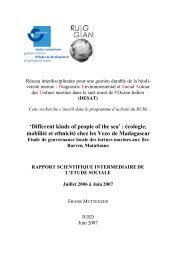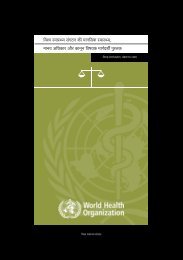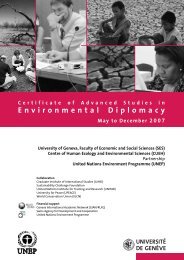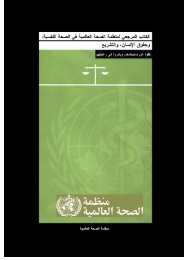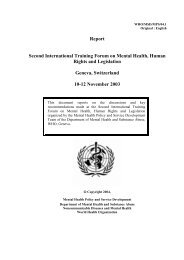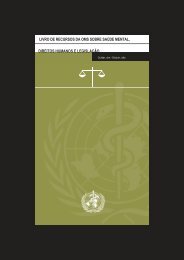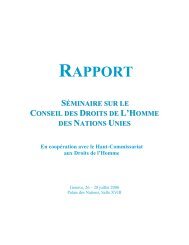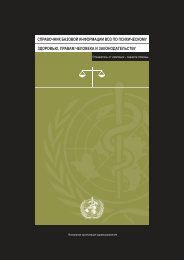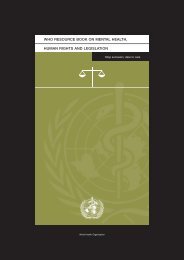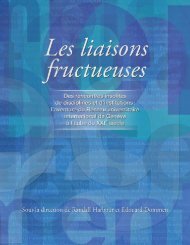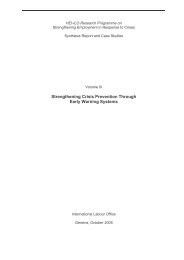Volume 1 Cedric - revised luca Final - RUIG-GIAN
Volume 1 Cedric - revised luca Final - RUIG-GIAN
Volume 1 Cedric - revised luca Final - RUIG-GIAN
You also want an ePaper? Increase the reach of your titles
YUMPU automatically turns print PDFs into web optimized ePapers that Google loves.
IGOs, NGOs—tend to exclude, or at least ignore, private sector actors. There appearsto be on the part of these organizations a preference or natural instinct, perhaps basedon organizational culture, to take account mainly of their own skills, capacities andfunds. To the extent that this perception is well-founded, mind-sets need to bechanged. Perhaps the evidence in this paper of the huge contribution that private sectoractors can and do make in post-crisis situations will help in that regard.1.2. Role of the social partnersThe title of this paper is ambiguous. In a narrow sense the term “social partners”refers to general associations of employers affiliated to the International Organisation ofEmployers (IOE), on the one hand, and trade unions affiliated to the InternationalConfederation of Free Trade Unions, on the other. In a broader sense “social partners” maybe taken to refer to all privately owned enterprises and their various general or ad hocassociations, whether or not affiliated to the IOE, and to workers and their organizationswhether or not unionized. For the most part this paper uses the latter, broader concept.Given the different types of enterprises dealt with, the diversity of employer-workerrelationships, and the variety of initiatives taken by different groups of enterprises andstakeholders in this field, the first definition would be too limiting.But the social partners in a narrow sense do have an important role to play in crisisresponse and it needs to be acknowledged. That can be seen in the case studies discussed inthe following chapters, notably in the one on Algeria. It also emerges from various reports,meetings and initiatives in the ILO or other international settings. For five consecutiveyears from 1999 to 2003, employer and worker delegates as well as government delegatesheld consultative meetings in Geneva on the roles of their affiliates in crisis response, inconjunction with sessions of the International Labour Conference.On the workers’ side an ILO meeting on trade unions in conflict-affected countrieswas held in 1997. Much of the discussion concerned the vulnerability of trade unions inconflict-affected countries and their need for international support; cases in which suchsupport was forthcoming were identified. There were also numerous examples, such asMozambique and Sierra Leone, of the contribution that trade unions could make and hadmade to reconciliation and peace-building upon the cessation of internal conflicts orbefore. 3On the employers’ side, in 1999 the IOE assisted with the creation of the South-Eastern European Employers’ Forum (SEEEF), which groups the national employers’organizations of eight countries of that region: Albania, Bosnia -Herzegovina, Bulgaria,Croatia, Macedonia, Moldova, Romania, and Serbia and Montenegro. The aim has been topromote the development of employers’ organizations in these transitional countries in aregion especially prone to conflict. Within the framework of the Stability Pact on theReconstruction of South-Eastern Europe these organizations, the IOE and ILO haveparticipated in an Initiative for Social Cohesion created by the Pact to examine issues ofeconomic reconstruction, development and co-operation, including the subjects ofemployment, social dialogue, social protection, and health and housing. Jointly with theEuropean Trade Union Confederation, the IOE has also participated in the establishment ofa network of experts in labour law, which has provided technical assistance andinformation exchange for these countries as they were in transition to democratic states3 Trade Unions in conflict-affected countries: experiences and roles in peace negotiation, social healing,reconstruction and development, Report on a Consultative Meeting for Workers’ Delegates, ILO, Geneva, 17 June1997.8


